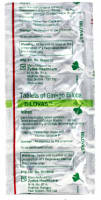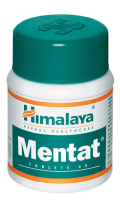NOTICE: unsafe with : Alcohol
USED FOR:
Depression
Anxiety disorder
Phobia
COMPOSITION:
Escitalopram (10mg)
Therapeutic Uses:
neuro cns

CAUTION
Sitaram 10mg Tablet may cause excessive drowsiness and calmness with alcohol.

WEIGH RISKS VS BENEFITS
Sitaram 10mg Tablet may be unsafe to use during pregnancy.Animal studies have shown adverse effects on the foetus, however, there are limited human studies. The benefits from use in pregnant women may be acceptable despite the risk. Please consult your doctor.

CAUTION
Sitaram 10mg Tablet is probably unsafe to use during lactation. Limited human data suggest that the drug could represent a significant risk to the baby.

Sitaram 10mg Tablet may cause side effects which could affect your ability to drive.

Sitaram 10mg Tablet should be used with caution in patients with severe kidney disease. Dose adjustment of Sitaram 10mg Tablet may be needed. Please consult your doctor.

CAUTION
Sitaram 10mg Tablet should be used with caution in patients with liver disease. Dose adjustment of Sitaram 10mg Tablet may be needed. Please consult your doctor.
Uses of Sitaram Tablet
Sitaram 10mg Tablet is used in the treatment of depression, anxiety disorder, phobia, post traumatic stress disorder and obsessive-compulsive disorder.
How to use Sitaram Tablet
Take this medicine in the dose and duration as advised by your doctor. Swallow it as a whole. Do not chew, crush or break it. Sitaram 10mg Tablet may be taken with or without food, but it is better to take it at a fixed time.
How Sitaram Tablet works
Sitaram 10mg Tablet is a selective serotonin reuptake inhibitor (SSRI) antidepressant. It works by increasing the levels of serotonin, a chemical messenger in the brain. This improves mood and physical symptoms in depression and relieves symptoms of panic and obsessive disorders.
Common Nausea, Headache, Diarrhoea, Fatigue.
Expert advice for Sitaram Tablet
It can take 2-3 weeks for Sitaram to start working. Do not stop treatment suddenly as this may cause a stomach upset, flu-like withdrawal symptoms and sleep disturbance. If your doctor asks you to stop Sitaram, you should reduce the dose slowly over 4 weeks. Avoid consuming alcohol when taking the Sitaram, as it may cause excessive drowsiness and calmness. The addiction/dependence potential of Sitaram is very less. You may develop anxiety during initiation of therapy.
Q. How does Sitaram work?
Sitaram works by increasing the levels of serotonin, a chemical messenger in the brain. This improves mood and physical symptoms in depression and relieves symptoms of panic and obsessive disorders.
Q. Can I take Sitaram with coffee?
There is usually no significant effect of taking coffee with Sitaram but a very high quantity of consumption of coffee may cause restlessness and anxiety.
Q. Is Sitaram addictive?
No. Sitaram is not addictive. Its abrupt discontinuation may cause some withdrawal symptoms. But still is not addictive as there is no drug-seeking behaviour and it has no abuse liability.
Q. Why does Sitaram cause nausea?
Sitaram increases the activity of serotonin a chemical which is also involved in the vomiting process so makes the person nauseating.
Q. Why does Sitaram make me tired?
Tiredness is usually associated with depression. Sitaram can alter the sleep quality and can make the person feel tired most of the time.
Q. Can I use Sitaram for a migraine?
Sitaram is not approved for the treatment of a migraine. It is used in the treatment of depression, anxiety disorder, phobia, post-traumatic stress disorder and obsessive-compulsive disorder.
Q. Can I use Sitaram for bipolar disorder?
Sitaram should not be used for the treatment of bipolar disorder as it can aggravate the problem. Only in few cases, it can be used that too with caution with other drugs if depression is the more persistent feature of person's bipolar illness. But the person should be very regular with drugs prescribed for the mania part also called mood stabilisers.
Q. Does Sitaram cause hair loss?
There are some case reports of hair loss with the use of Sitaram. It is very infrequent and it usually stops after the discontinuation of the drug. It can be very distressing for a person, especially for the females. So a person should tell his doctor if he is having hair loss with the use of Sitaram.
Q. Can I use Sitaram for sleep problem?
Sitaram may itself cause sleep disorders. So it is not recommended for the sleep problem.
Q. Can I use Sitaram for obsessive-compulsive disorder (OCD)?
Sitaram can be used for the treatment of obsessive-compulsive disorder (OCD) but there are better alternatives available, in case they don't work then Sitaram can be used. Although it is prescribed in a higher dose and for longer duration in case of OCD in comparison to depression.
Q. Which is better medication, Sitaram or sertraline?
Sitaram is the safest drug in its class. Sertraline can be used in case Sitaram doesn't work for depression. However, setraline can be preferred in case of obsessive-compulsive disorder (OCD).
Q. Which is better medication, Sitaram or citalopram?
Sitaram is more effective than citalopram for major depression. Although some studies have shown that there is no difference among two in case of effectiveness but some recent studies have shown Sitaram to be superior to citalopram for major depression.
Q. Can I take Sitaram with diphenhydramine?
It is better to avoid diphenhydramine with Sitaram. Diphenhydramine can aggravate side effects of Sitaram and can cause dizziness, confusion and difficulty in concentrating.
Q. Can I take Sitaram with aspirin?
It is usually avoided as it can increase the chances of bleeding.
Q. Can I take Sitaram with Ibuprofen?
No. Combined these two drugs may increase the chances of bleeding especially in persons already on a blood thinner. Nasal bleeding is usually the first symptom.
Q. Can I take Sitaram with methylphenidate?
It is better to avoid methylphenidate with Sitaram. Because methylphenidate can increase the blood levels of Sitaram and its effects and rarely can cause a serious condition called serotonin syndrome with symptoms like anxiety, restlessness, extreme changes in heart rate and blood pressure, blurred vision, incoordination, nausea, vomiting, diarrhoea.
Q. Can Sitaram be given with lisdexamfetamine?
It is better to avoid this combined therapy of lisdexamfetamine with Sitaram, it leads to increased anxiety, restlessness and sometimes serotonin syndrome. Serotonin syndrome includes vomiting, diarrhoea, extreme changes in blood pressure and even seizure may occur. It can be life-threatening.
Q. Can I take Sitaram with alprazolam?
It is better to avoid the combination, it can lead to increased dizziness, confusion and difficulty in concentrating. Please consult your doctor before taking these two medicines together.
Q. Can I take Sitaram with clonazepam?
It is better to avoid the combination, it can lead to increased dizziness, confusion and difficulty in concentrating. Please consult your doctor before taking these two medicines together.
Q. Can Sitaram be used with hydrocodone?
It is better to avoid the combination, it can lead to increased dizziness, confusion and difficulty in concentrating. Please consult your doctor before taking these two medicines together.
Q. Can I take Sitaram with dextromethorphan?
You should not take Dextromethorphan with Sitaram. It can lead to the seotonin syndrome. Before taking any medications with Sitaram, your should consult with your doctor.
Q. Can I take Sitaram and paracetamol?
Yes. There is no known interaction between Sitaram and paracetamol.
Q. How does Sitaram differ from fluoxetine?
Sitaram and fluoxetin belongs to same class of medicine called as selective serotonin reuptake inhibitor (SSRI).
Q. How doses Sitaram differ from amitriptyline?
Sitaram is a newer drug belongs to class selective serotonin reuptake inhibitor (SSRI) while amitryptiline is an older drug belonging to class tricyclic antidepressants (TCA). Both drugs are almost equally effective for treating depression but Sitaram has much lesser side effects in comparison to amitryptiline and so preferred over amitryptiline for the treatment of depression.
Q. How does Sitaram differ from imipramine?
Sitaram is much safer than imipramine and is preferred in most of the conditions over imipramine. However, imipramine can be preferred in bed-wetting in children.
Q. What would happen if I stop taking Sitaram?
You may experience withdrawal symptoms which can be in the form flu like symptoms, anxiety, suicidal thoughts, nausea or sleep problems. These symptoms usually last for one to two weeks. Do not stop taking this medicine without consulting your doctor.
Q. When and How to stop Sitaram?
You should consult your doctor before stopping the treatment. It would depend on the number and severity of depressive episodes.The dose should be tapered slowly to prevent intense withdrawal symptoms.
Q. Is Sitaram a benzodiazepine?
No. Sitaram is not a benzodiazepine. Benzodiazepines decrease the anxiety and induce sleep. Sitaram belongs to the class of selective sertonin reuptake inhibitor (SSRI). It may cause insomnia and restlessness initially as the side effect which usually goes away with time.
Q. Is Sitaram a narcotic?
No. Sitaram is not a narcotic drug. Narcotics are drugs with sleep inducing properties, usual derivatives of Opium like Heroin and Morphine.


 Sitaram 10mg Tablet
Sitaram 10mg Tablet  Bookmark
Bookmark




















